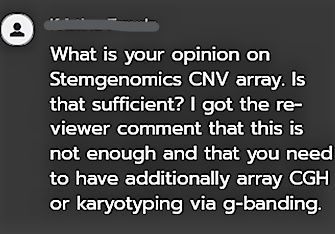You have reached the stage where you would like to get your research published, and you want to put all the chances on your side for a smooth approval. Although the process can be quite lengthy and complex, we would like to share some insights on the topic of genomic stability testing, based on our clients’ real-life experience.
During the last ISSCR webinar on Standards for Stem Cell Research, a question came up about our iCS-digital™ PSC test in the audience Q&A. Although Ivana Barbaric did a great job answering the question, we thought it was an interesting topic we could expand upon, as it will matter to whoever uses our test and might be considering future publications.
So, for all of you who did not attend the webinar, here is the question:
A simple answer, just as Ivana said, could be: “It depends on the context”.
As Ivana has a good grasp of our assay, she provided some additional useful information. She explained that iCS-digital™ PSC was very well suited to periodical checks, as it looks for the recurrent aberrations most likely to appear on hiPS cell lines. However, for Master or Working Cell Banks, an assay that gives an overview of the whole genome would probably be a better choice. We fully agree, as this is also the guidance we provide our clients in this hiPSC workflow.
The answer did not specifically address the tricky issue of publication reviews, so we decided to attempt an answer based on our clients’ real-life experience and provide you with extra guidance*:
1. Some publications will validate your study with iCS-digital™ PSC used as the sole genomic stability test
In some instances, the iCS-digital™ PSC will indeed suffice. The 24-probe version of our iCS-digital™ PSC test specifically targets the most recurrent abnormalities found in hiPSC with great accuracy, including the 20q that a G-Banding karyotype will miss. As the 20q11.21 represents 20% of anomalies found in hPSC, relying on G-Banding alone might not be the most robust genomic testing strategy.
The iCS-digital™ PSC 24-probe test is also a highly reproducible, reliable assay, presenting 20% mosaicism threshold. All these criteria make it a strong candidate for hPSC researchers’ RUO in-process workflow (click here for a full analytical performance review).
It is therefore not surprising that it has been accepted as the sole genomic stability assay by reviewers from Stem Cell reports, Stem Cell Research and therapy, Cells and Current Eye Report (Brot et al. 2022, Duchesne de Lamotte et al. 2021, Roudaut et al. 2021, Rupendra Shrestha et al. 2020.)
If you are approaching reviewers from other publications and want to err on the side of caution, we would recommend you combine our iCS-digital™ PSC with a G-Band karyotype. This way, you keep all your bases covered for RUO research QC.
The good news is that we can also help you with this!
2. Duo iCS-Karyo will check all the boxes with reviewers
The current and long-standing reviewer-accepted test for confirming the genomic stability of your iPS cells is the G-Banding karyotype. We therefore thought it would be a good idea to combine it with our iCS-digital™ PSC 24-probe test to ensure we covered all the bases for RUO genomic quality controls for you.
By combining both assays, we can check the following:
• Balanced and unbalanced translocations
• Aneuploidy
• Inversions
• Duplications/deletions
• Abnormalities >5-10 Mb and 10% mosaicism
• The most frequent sub-karyotypic abnormalities observed in hPSCs (CNVs) > 200 bp and 20% mosaicism
This way, you check all the genomic QC boxes and hopefully stand a better chance of being published!
Check out our video for more information about Duo iCS-Karyo or visit Duo iCS-Karyo’s dedicated web page.
In short, whether you choose iCS-digital™ PSC or Duo iCS-Karyo, you can rest assured you have made a strong and reliable choice for checking the genomic stability of your hPSC cells. As the awareness of our iCS-digital™ PSC grows, we can only hope it will receive increased acceptance from reviewers.
And remember, whatever the requirements from reviewers, we’ll happily help you with a specific assay that meets your needs.
*Please note that these real-life experiences are during research and not clinical stages.


